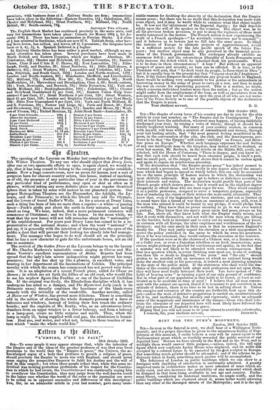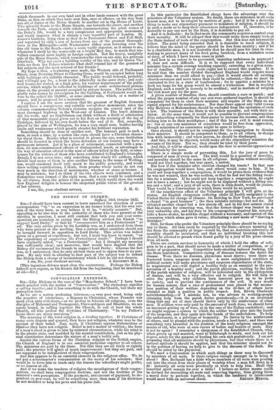HINT FOR THE DUKE'S MONUMENT.
London, 10/11 October 1852. Sax—As soon as the funeral is over, we shall hear of a Wellington Testi- monial; and if a proper direction be given to the unanimous feeling of Eng- lishmen at this moment, I verily believe a sum will be raised equal to the Parliamentary grant which so worthily rewarded the public services of our departed hero. Statues we have already in the East and in the West, and to multiply them would answer little purpose,—unless, indeed, the tall ugly figure which now confronts Apsley House were displaced, and its noble site occupied by a colossal figure to be executed by the Slat sculptor in Europe. But something much greater should be attempted ; and if the scheme be ju- diciously taken in hand, something much greater will be accomplished.
The deficiency of London in public buildings which we can show to a foreigner with anything of satisfaction is universally admitted. A greatly improved taste in architecture makes us more ashamed of some which al- ready exist, and also increases the probability of any memorial which shall be designed in that form being creditable to our age and country. Parlia- ment Street, considering its historical traditions, its ample width, and the public buildings which are clustered about it, seems better worth adorning than any other of the thronged streets of the Metropolis; and it is the spot
which thousands in our own land and in other lands connect with the great Duke, as that on which they have seen him, once or oftener, on his way from one set of duties at the Horse Guards to another set in Ole House of Lords. Two splendid fronts to the Horse Guards, one towards the street, and another towards the Park, adorned with reliefs commemorating the great scenes of the Duke's life, would be a very conspicuous and appropriate monument, and would improve what is already a very beautiful part of London. St. James's Gardens, lying close as they do to Parliament Street and Pall Mall, and separated by only a row of houses from one of the greatest thorough- fares in the Metropolis—with Westminster Abbey seen towering over the fine old trees to the South—make a scene vastly superior, as it seems to me, whenever I stroll by the water-side on a bright May day, to much that tra- vellers commend more highly in foreign capitals. But the heavy, unsightly pile of the Horse Guards, which terminates the view on one side, is a grievous drawback. Why not erect a building worthy of the site, and let Queen Vic- toria see from her Palace-windows what shall remind her of the greatest of her subjects and the most revered of her friends ? My hope is that, a beginning once made, the Western side of Parliament Street, from Downing Street to Charing Cross, would be occupied before long with buildings of a suitable character. The public would demand, probably, and willingly pay for, a front to the Admiralty in the same style ; and scat- terd houses are rented, at a high price, for various departments of the public service, which might be collected in buildings of some architectural preten- sions on the ground at present occupied by private houses. The public would gladly raise money by subscription for the building, if Parliament would de- vote to the reliefs the 10,0001., or sonic similar sum, which, as a matter of course, will be proposed for a monument. I confess I am the more anxious that the greatest of English Generals should have a conspicuous and suitable out-of-door monument, since the column commemorating Nelson's victories occupies the central spot of the most thronged highway in the West-end of London. The brave Admiral did his work, and no Englishman can think without a thrill of admiration of that memorable signal given out to his fleet on the morning of the day of Trafalgar, followed by his own death before the end of it. But, assuredly, placed by the side of Wellington, he was a very small man, besides having faults and weaknesses which greatly clouded his brilliant reputation. Something should be done of another sort. The honours paid to such a man; at such a time, by a nation like ours, should have a Christian charac- ter about them. Besides what is erected to please the eye, some institution should be founded in which the brave defenders of our country may have a permanent interest. Let it be a place of retirement, connected with a pen- sion, for non-commissioned officers of distinguished merit, or advantages in the way of education offered to the song of officers killed in the field, or alms- houses for the widows of those who have contributed to England's triumphs. Details I do not enter into; only something done wisely for soldiers, which should lead many of them to give another blessing to the name of Welling- ton, would commend itself very much to the public generally, and would draw willing contributions, I think, from persons whose tastes do not run very much in the direction of monuments, whether of stone or bronze. I may be mistaken, but I do think if the two objects were combined, and a Committee were formed of the right men, that a sum would be contributed by all classes, from the prince to the peasant, which would show the world how England delights to honour the unspotted public virtue of the greatest of her citizens.



























 Previous page
Previous page